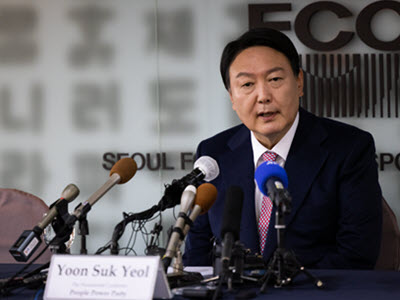The Election of Yoon Suk-yeol and Implications for the United States
South Korea’s Foreign Policy
This commentary by Seong-hyon Lee is part of the roundtable “The Election of Yoon Suk-yeol and Implications for the United States.”
The election of Yoon Suk-yeol as the new president of the Republic of Korea (ROK) is expected to catalyze a seismic geopolitical shift in South Korea’s foreign policy. The policies of outgoing president Moon Jae-in were widely viewed as leaning toward China. Yoon is expected to align the ROK more closely with Joe Biden’s proposed Indo-Pacific strategy.
Specifically, he plans to join the Quad multilateral regional cooperative initiative in phases, starting with its working groups on vaccine, climate change, and emerging technologies. Under Yoon, South Korea can be expected to repair ties with Japan by implementing a “future-oriented” diplomacy and reinstituting an annual shuttle diplomacy between the two countries. He is also expected to take part in trilateral security coordination with the United States and Japan, including the formulation of trilateral economic and security dialogues at the ministerial level.
The joint statement that Presidents Moon and Biden signed in May 2021 called for a “comprehensive partnership” between the ROK and the United States. Yoon will take steps to actualize this partnership by expanding the security-focused alliance to include economic and values-based dimensions. Specifically, he has pledged to cooperate with the United States on the “development of cutting-edge semiconductors, batteries, cyber-tools, space travel, nuclear energy, pharmaceuticals, and green technologies” and has said he would host a future gathering of Biden’s Summit for Democracy in Seoul.
Yoon’s primary foreign policy challenge will be China. His near 180-degree recalibration of South Korea’s foreign policy is bound to bristle Beijing, which is Seoul’s largest trading partner. China has previously weaponized this trade dependence when retaliating against South Korea over its decision to host the advanced U.S.-missile battery system, called Terminal High Altitude Area Defense (THAAD).
Upon the news of Yoon’s presidential election, Xi Jinping sounded a cautious welcome to him, stating that “China is willing to uphold the ‘original intention of establishing diplomatic relations’ (jianjiao chuxin) with the ROK.” The statement, however, was a thinly veiled warning that South Korea should not veer off from Moon’s foreign policy, which Yoon has criticized as “tilted toward China.” Yoon responded by saying that he hopes China will “play a responsible role as a global player.”
It is unavoidable that South Korea and China will have a rocky readjustment period in their relationship. Yoon in his campaign specifically criticized Moon’s promise of the “three no’s” (no additional THAAD deployments, no participation in a U.S.-led global missile shield, and no creation of a trilateral military alliance involving Japan) intended to accommodate China’s regional security concerns. China thus will keenly watch Yoon’s actions in this regard once in office, as well as whether he pursues membership in the Quad, which China sees as a U.S. attempt to create an “Asian version of NATO,” or changes South Korea’s position on the sensitive Taiwan issue.
A potentially explosive factor that could shape Yoon’s foreign policy is anti-Chinese sentiment in South Korea. This year marks the 30th anniversary of diplomatic relations between South Korea and China. Yet bilateral ties today are at the lowest level in history, owing partly to the unprecedently strong anti-Chinese sentiment among the South Korean public. A recent Pew Research Center survey found that anti-Chinese sentiment in the ROK is even higher than in the United States. During the presidential campaign, China criticized South Korean politicians for “taking advantage” of such sentiment to improve their standing with the public.
Looking ahead, how anti-Chinese sentiment shapes South Korea’s foreign policy trajectory will be keenly watched in Beijing. In a democratic country, the public’s prevailing sentiment of the day can be expected to find its way into government policy, especially under Yoon. For Washington, this naturally means expedient opportunities for public diplomacy with Seoul. One notably underutilized area is the exchanges between staff in the U.S. Congress and the ROK National Assembly. Mutual visits, especially among young staff, for both intensive short-term workshops and regular programs, could be robustly institutionalized to cultivate next-generation policymakers and opinion leaders.
Seong-hyon Lee is a Senior Fellow at the George H.W. Bush Foundation for U.S.-China Relations and a Visiting Scholar at Harvard University’s Fairbank Center for Chinese Studies. He is the former director of the Center for Chinese Studies at the Sejong Institute in South Korea.



